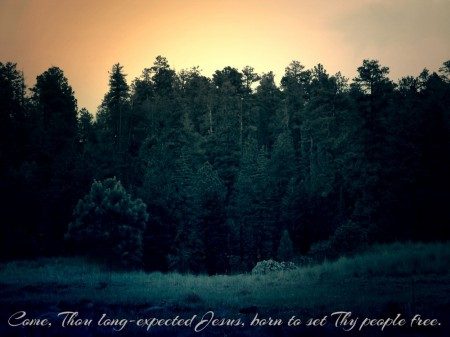The Incarnation is so very many things. There are so many other things, of course, that it is not.
The Incarnation, in particular, is about God become a human being – and not the other way around. The Incarnation is about the Son of God pouring himself out, taking on human flesh, assuming the form of a servant and becoming obedient unto death (Philippians 2:5-11). It is about the Word made flesh come now to dwell among us, full of grace and truth (John 1:14). It is about the Eternal Father entering the actual conflicted life we too must live (Isaiah 9:6). And he enters to redeem us (Luke 19:10).
A few days ago, one of my five-year-old grandsons debriefed with me, a little, his Sunday School lesson from the weekend before. “We heard about the Sea of Galilee, and stuff,” he reported with some enthusiasm. “I think that’s where God used to live.”
My grandson had his theology pretty close to correct, I think – except for the tense. God still lives in places like the Sea of Galilee. And in places like your heart and living room, too (cf. Isaiah 57:15).
“The Word became flesh and blood and moved into the neighborhood” (John 1:14, The Message). This is the place and we are the ones among whom God has come, set up shop, introduced heaven, sought and healed and redeemed his wayward ones. This is what the Incarnation is about. In Jesus Christ, God the Father Almighty has appeared on the scene to reconcile the world to himself (2 Corinthians 5:18-19).
 The Incarnation is not, however, about human beings becoming divine. It is not about human flesh aspiring to heaven. It is not about divinizing the world that surrounds us, as if tawdry earth were progressing inexorably heavenward. The Incarnation is about heaven descending to earth, not earth on some slow rise to heaven.
The Incarnation is not, however, about human beings becoming divine. It is not about human flesh aspiring to heaven. It is not about divinizing the world that surrounds us, as if tawdry earth were progressing inexorably heavenward. The Incarnation is about heaven descending to earth, not earth on some slow rise to heaven.
And the Incarnation is not about some divine spark in human hearts, which might be fanned into flame with the proper inspiration. There is no divine spark within us. There is only a hole, as St. Augustine so aptly described, which cannot be filled in any way whatsoever – unless God by his grace should fill it.
The Incarnation is more like an invasion. It is about the King crossing enemy lines to claim as his own what is rightfully his. It is about Rescue and Redemption. It is about the Righteous One coming to make us righteous and the Holy One coming to make us holy. It is about the Great Healer coming to heal cracked and wayward things – not to bless or complete their natural “spark” of goodness, somehow. It is about the Redeemer of the world coming to win the world and its peoples to himself.
You may get a feel for the Incarnation of God by the proclamation that characteristically follows: “Repent, for the kingdom of heaven has come near!” (Matthew 3:2). Repentance is the only reasonable response – not some comfortable progression, or cozy meditation, or fanning some “spark” into flame.
In Jesus Christ, the Kingdom of Heaven has revealed its amazing design. In Jesus Christ, we have learned the King’s name and seen his deepest heart displayed. He has come to us in this Baby, this Boy, this Rabbi and Messiah, this Crucified and Risen Lord.
In Jesus, the Kingdom of Heaven has come radically near – and calls us now to repentance and faith. Not to look within, but to look to him. Not to fan some flame within us, but to enter the bracing light of Day.
So now, at Christmas time, let us pause to remember what the Incarnation is all about.
It is about a Baby, certainly, the visit of shepherds and angels’ songs.
It is also about an Invasion that changes everything forever, and calls every heart to faith. This Child, you see, is the Creator of All Things, the Eternal Father, the King of kings. And He has come. He is here. He comes to lay claim upon your life and mine. He comes to redeem us, then make us agents of his redemption throughout the world.